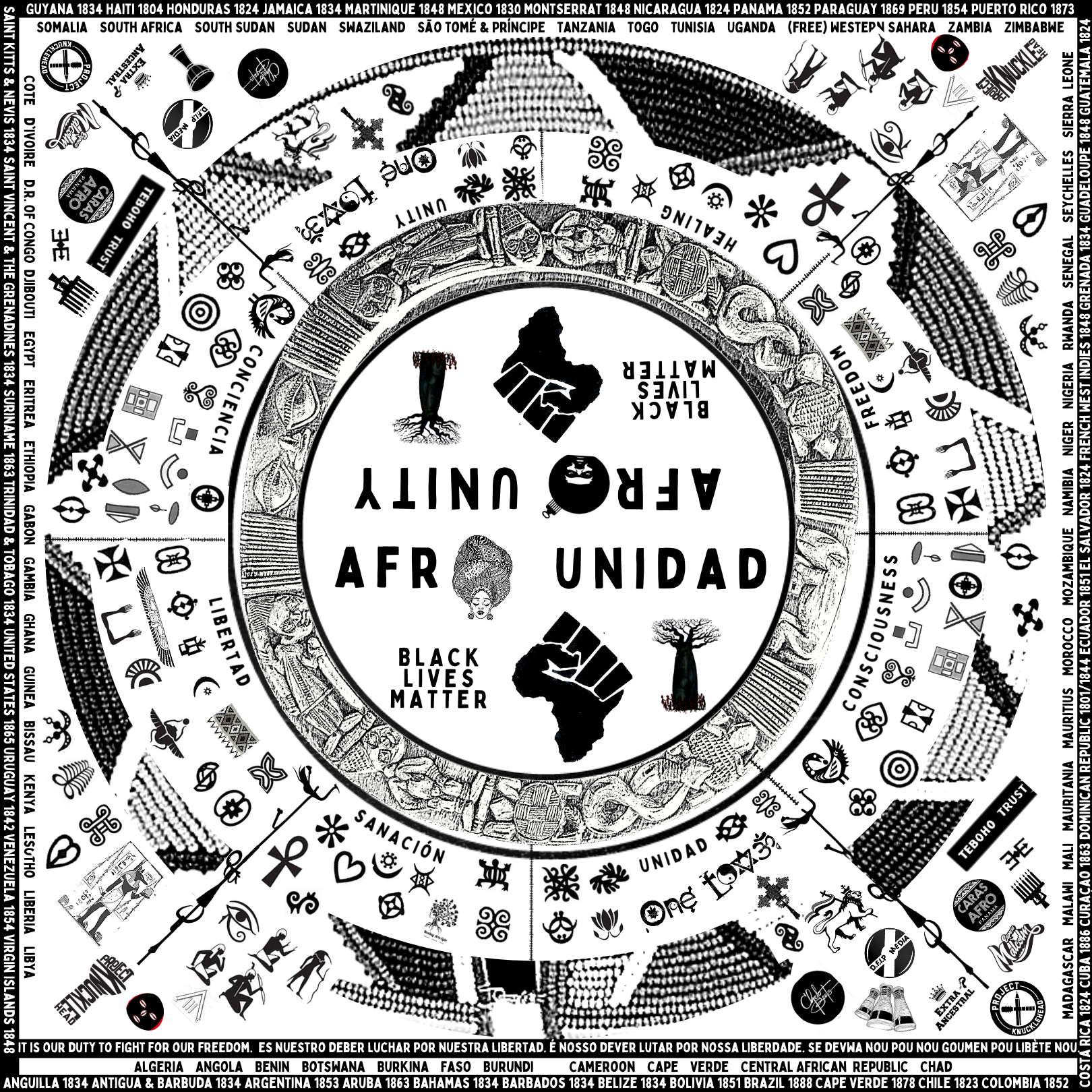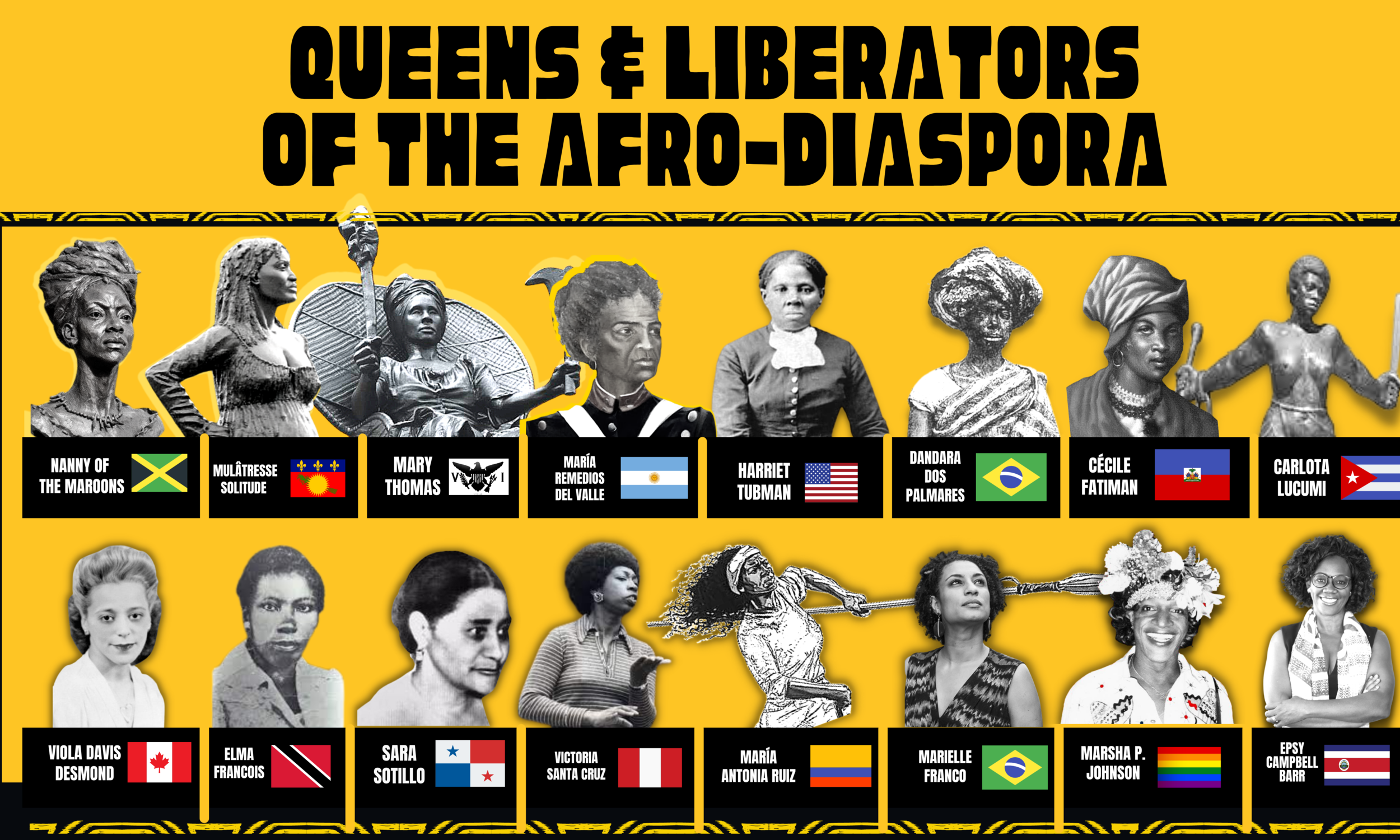RESEARCH FOR AFRO CULTURE & UNIDAD
TRADUCIR AL ESPAÑOL TRADUZ PARA O PORTUGUÊS
This page compiles some of the research of our Soul Scholars of Afro Unidad. Several of our ambassadors are professional researchers and we hope to host multi-lingual conversations soon. Contact us at info@afrounidad.com if you’re interested in collaborating or contributing.
RESEARCH AREAS INCLUDED BELOW
Afro Rebellions & Memorial Our Interactive map with 270+ rebellions from enslaved Africans across 50+ countries.
Afro Musicology/Rhythms of the Exodus: Our interactive map and 200+ styles of Afro music. Purchase a draft version of our Encylopedia of Afro Diaspora Music for a printed version.
Diaspora & Samba Rock: Research project by Dr. Karina Sousa in Brazil. Maps and videos below,
Cultural Criminalization: We’re compiling laws about criminalizing Afro culture and the drum around the world.
Queens & Liberators of the Afro Diaspora: We’re compiling information about revolutionary Black women. We started with 32 women from 25 countries featured on our Queenshiki.
Symbols for Afro Unidad: We’ve compiled over 50 symbols from West, East, South, and North Africa for our Afro Unidad bandana. Learn about them below.
SYMBOLS OF AFRO UNIDAD
This divine cloth includes 50+ distinct Afro symbols from all over the Mother Land and diaspora. Some go back thousands of years like the Ankh, Eye of Horus, and Adinkra. The border lists 100+ countries; every nation in Africa and across the diaspora. The years of emancipation are listed for the 50+ countries across the diaspora. Purchase the 2021 flag bandana below for $10 with a matching dashiki or hat in our store. Learn more about the specific meaning of the 50+ Afro symbols below.
AFRO REBELLIONS & MEMORIAL
INTERACTIVE MAP WITH 200+ STYLES OF AFRO MUSIC AND 100+ STYLES OF AFRO DANCE
BANNER OF 200+ STYLES OF AFRO MUSIC, COLORED BY REGION
FORBIDDEN RHYTHMS: AFRO-CULTURAL CRIMINALIZATION ACROSS 12+ COUNTRIES
QUEENS & LIBERATORS OF THE AFRO-DIASPORA
Learn more about International Day of Women of African Descent here. This inspired the research to honor the Queens. The first 32 Queens are listed below by the order that they appear. More Queens and a full map coming soon.
QUEEN NANNY JAMAICA Liberator 1728
Queen Nanny was a Liberator in the First Maroon War starting in 1728. Nanny led the Windward Maroons through guerrilla warfare against the British in Jamaica. After defeating the British in 1740, the Maroons signed a treaty that guaranteed their freedom, ended aggression, and, provided 500 acres of land to Nanny and her followers. The village built on the land grant still stands and today is called Moore Town/New Nanny Town.
HARRIET TUBMAN USA Liberator/Abolitionist 1849
Saint Harriet completed 13 missions on the Underground railroad that liberated 70+ enslaved Africans. She became an armed scout and spy for the Union Army and as the first woman to lead an armed expedition in the war, she led the raid at Combahee Ferry, which liberated more than 700 enslaved people.
LA MUL TRESSE SOLITUDE GUADELOUPE Liberator 1802
After the abolition of slavery in 1794, La Mulatrese joined a Maroon community in Guadeloupe. Napoleon came to power in 1799 and reinstated slavery in the French colonies. The Guadeloupeans, put up resistance and La Mulatrese was a warrior and leader despite being pregnant.
QUEEN MARY VIRGIN ISLANDS Liberator 1878
Mary Thomas came to be known as "Queen Mary" for her leadership in the Fireburn riots when more than 50 plantations were burned. She and other queens performed ritual and celebratory functions during the uprising. A folk about her legacy says “Queen Mary, ah where you gon' go burn? Don' ask me nothin' t'all. Just geh me de match an oil!”
MARÍA REMEDIOS DEL VALLE ARGENTINA Liberator 1810
Maria also known as the "Madre de la Patria" (Mother of the Homeland), was an Afro-Argentine soldier who fought in the Argentine War of Independence. Wounded in battle, captured, imprisoned and escaped. She was originally denied access to the frontline because she was a woman. She defied the orders and was promoted to captain.
DANDARA DOS PALMARES BRAZIL Queen Warrior 1670
Dandara was part of the Quilombo dos Palmares, a settlement of Afro-Brazilian people who freed themselves from enslavement, in the present-day state of Alagoas. Described as a hero, Dandara dominated the techniques of capoeira and fought many battles alongside men and women to defend Palmares, the place where Africans who escaped slavery could go to live safely. She and her husband Zumbi dos Palmares, the last king of the Quilombo dos Palmares, had three children.
CÉCILE FATIMAN HAITI Liberator/Revolutionary 1803
Cecile was a vodou priestess (mambo). She participated in the vodou ceremony considered to be one of the starting points of the Haitian Revolution. A week later, 1800 plantations had been destroyed and 1000 slaveholders were killed. She is reported to have lived to the age of 112.
CARLOTA LUCUMI CUBA Liberator 1843
Carlota was one of the leaders of a major rebellion in Mantanzas, Cuba. Carlota was an African-born free woman from the Kingdom of Benin, West Africa. Using music as a form of communication, she sent coded messages by talking drum to nearby plantations, coordinating the rebellion.
MARÍA ANTONIA RUIZ COLUMBIA Liberator 1811
Maria is described as "the Black woman of the Independence movement". After avenging her son, she burned the building where the colonizers kept ammunition and firearms, then destroyed part of the Spanish army with a cannon. When out of ammunition, she took up the spear and got on a horse to lead further resistance.
ELMA FRANCOIS TRINIDAD TOBAGO Activist 1935
Francois was a lion amongst men who led when women were expected to assume certain roles in the gender segregated Caribbean society. She’s a national hero of Trinidad known for her pro-trade union, anti-war and anti-colonial work. In 1937, during the labour riots, Francois became the first woman in Trinidad and Tobago to be charged and tried for sedition. In a show of true strength, she represented herself in court and was found not guilty by the ruling jury.
SARA SOTILLO PANAMA Activist 1922
Sara was an educator, feminist, and founder of the National Feminist Party of Panama. She also co-founded the Women's National Party. In 1944 she founded the United Teachers Association of Panama and assisted in passing a law in 1946 that reduced illiteracy.
VIOLA DAVIS DESMOND CANADA Activist 1946
Viola refused to give her seat to a white person in Canada a decade before Rosa Parks bravely did the same in the USA. Viola did this by declining to leave the whites-only area of a theatre in Nova Scotia. She was arrested, denied legal representation, and unfairly and "erroneously" convicted of tax evasion. Despite the injustices, she helped ignite the civil rights movement in Canada and is the first Canadian woman to appear on their money.
VICTORIA SANTA CRUZ PERU Activist 1965
Victoria was a choreographer, composer, and activist. She’s considered "the mother of Afro Peruvian dance and theatre." Along with her brother, Nicomedes Santa Cruz, she led a revival of Afro-Peruvian culture in the 1960s and 1970s.
MARIELLE FRANCO BRAZIL Activist/Politician 2016
Marielle was politician, sociologist, feminist, socialist, and human rights activist. She served as a city councilor in of Rio de Janeiro for the Socialism and Liberty Party (PSOL) from January 2017 until her assassination by police officers. Franco had been an outspoken critic of police brutality and extrajudicial killings. Franco fought against gender violence, for reproductive rights, and for the rights of favela residents.
MARSHA P. JOHNSON USA Activist 1969
Marsha was a gay liberation activist and self-identified drag queen. Known as an outspoken advocate for gay rights, Johnson was one of the prominent figures in the Stonewall uprising of 1969. Marsha co-founded the radical activist group Street Transvestite Action Revolutionaries (S.T.A.R.) with Sylvia Rivera.
EPSY CAMPBELL BARR COSTA RICA Politician/Vice President 2018
Epsy is Costa Rica’s first woman of African descent to become vice president, and the second female vice president of African descent in the Americas following Viola Burnham.
EMPRESS TAYTU BETUL ETHIOPIA Queen Warrior 1896
Empress Betul was as a formidable queen of Ethiopia. An astute diplomat, she proved to be a key figure in thwarting Italian imperialist designs on Ethiopia. Determined to resist imperialist designs on her country, she increasingly opposed any negotiations that would result in the loss of Ethiopian territory. During wars, she rode out at the head of her own army, at her husband’s side. She founded Addis Ababa, which remains Ethiopia’s capital city today.
QUEEN NEFERTARI EGYPT Queen 1255 B.C.
Nefetari was an Egyptian queen and the first of the Great Royal Wives of Ramesses the Great.Nefertari means 'beautiful companion'. She was famous for her diplomatic work, corresponding with other prominent royals of the time.
WINNIE MANDELA SOUTH AFRICA Emancipator/Activist 1993
Winnie was an anti-apartheid activist and politician, and the second wife of Nelson Mandela. She served as a Member of Parliament from 1994 to 2003, and from 2009 until her death, and was a deputy minister of arts and culture. As a freedom fighter, she was detained by apartheid state imprisoned, tortured, subjected to banning orders, banished to a rural town, and spent several months in solitary confinement. She led a "reign of terror", and was "at the centre of an orgy of violence”, which led to condemnation by the anti-apartheid movement in South Africa.
QUEEN NZINGA /NJINGA ANGOLA Queen Warrior 1663
Queen Nzinga of Ndongo (Angola) was a powerful monarch who successfully kept the Portuguese out of her land for 35 years. Queen Nzinga conquered neighboring kingdoms to expand her territory, led her warriors in battle until her sixties, and defied numerous assassination attempts to die peacefully in her sleep at 81.
QUEEN OF SHEBA / MAKEDA ETHIOPIA Queen 1000 B.C.
Makeda is a Queen mentioned in the Hebrew Bible and other religious texts. In the original story, she brings a caravan of valuable gifts for the Israelite King Solomon. This account has undergone extensive Jewish, Islamic and Ethiopian elaborations. According to the Yoruba people in Nigeria, she was a wealthy, childless noblewoman of theirs known as Oloye Bilikisu Sungbo. A medieval system of walls and ditches, known as the Eredo and built sometime around the 10th century was dedicated to her.
FUNMILAYO RANSOME KUTI NIGERIA Emancipator 1940
Funmilayo was an educator, political campaigner, suffragist, and women's rights activist. the Abeokuta Women’s Union and fought for women’s rights, demanding better representation of women in local governing bodies and an end to unfair taxes on market women. Described as the "Lioness of Lisabi", she led marches and protests of up to 10,000 women. Ransome-Kuti received the Lenin Peace Prize and was awarded membership in the Order of the Niger. Her son Fela Kuti, was a musician and activist, became known for his vocal criticisms of Nigerian military governments. Funmilayo was murdered by military police during a raid on Fela’s home but is eternal through her work for freedom.
WANGARI MAATHAI KENYA Activist/Environmentalist 2004
Wangari was the founder of the Green Belt Movement and the 2004 Nobel Peace Prize Laureate. She was the first woman in East and Central Africa to earn a doctorate degree and helped to plant thousands of trees.
AOUA KEITA MALI Activist/Politician 1959
Aoua was a Malian midwife and anti-colonial activist. In 1959 she was the first woman from French-speaking West Africa to be elected to the national legislative assembly. She set up a women’s trade union and participated in the creation of a Panafrican women’s organization.
BIBI TITI MOHEMED TANZANIA Emancipator 1969
Bibi was a politician of Muslim descent and member of the Tanganyika African National Union (TANU), the party that fought for the independence of Tanzania, and held various ministerial postitions. In 1969, she was sentenced for treason, and, after two years in prison, received a presidential pardon. Bibi was the leader of the women's wing of TANU, called Umoja wa Wanawake wa Tanzania (UWT).
ROSE LOKISSIM CHAD Activist Warrior 1984
Rose was one of the first female elite soldiers from Chad. She fought against Hissène Habré's dictatorship (supported by the USA) in the 1980s. After being arrested by secret police, she was placed in prison with men for fear of escaping. After surviving months of torture, she state "even if she dies in prison, she doesn't regret it, because Chad will thank her and history will talk about her". The next day she was execute at age 33, but she is eternal through her work for liberation.
ASSATA SHAKUR USA Activist 1973
Assatais a former member of the Black Liberation Army (BLA), who was convicted in the first-degree murder of State Trooper during a shootout in 1973. Her defense had argued medical evidence suggested her innocence. Shakur escaped in 1979 from the Clinton Correctional Facility for Women in Union Township, NJ, now the Edna Mahan Correctional Facility for Women. She surfaced in Cuba in 1984, where she was granted political asylum. Shakur has lived in Cuba since, despite US government efforts to have her returned. She has been on the FBI Most Wanted Terrorists list since 2013 and was the first woman to be added to this list.
ROSA PARKS USA Activist 1955
Rosa is known for starting the Montgomery Bus Boycott in 1955. It was a foundational event in the civil rights movement in the United States.
ALDA DO ESPIRITU SANTO SÃO TOMÉ & PRÍNCIPE Emancipator 1975
Alda is a poet and politician who is the author of the lyrics of the São Tomé and Príncipe’s national anthem, "Independência total". In 1975, he became one of the leaders of the Associação Cívica pró
ROSE ZIBA MALAWI Emancipator 1964
Rose organized Malawian women in their political fight against the British as a political force to be reckoned with alongside their menfolk in the push for independence. She was arrested in 1959, two days after giving birth. After Malawi gained independence in 1964, Rose Chibambo was the first woman minister in the new cabinet. When she fell out with Hastings Banda she was forced into exile for thirty years, returning after the restoration of democracy
ANGELA DAVIS USA Activist 1970
Angela is a political activist, philosopher, academic and author. She is a professor at the University of California, Santa Cruz. A Marxist, Davis was a longtime member of the Communist Party USA (CPUSA) and is a founding member of the Committees of Correspondence for Democracy and Socialism (CCDS). She is the author of over ten books on class, feminism, race, and the US prison system.
NINA SIMONE USA Activist 1965
Nina was a singer, songwriter, musician, arranger, and civil rights activist. Her music spanned a broad range of musical styles including classical, jazz, blues, folk, R&B, gospel, and pop. Simone performed and spoke at civil rights meetings, such as at the Selma to Montgomery marches. Like Malcolm X, her neighbor in Mount Vernon, New York, she supported black nationalism and advocated violent revolution rather than Martin Luther King Jr.'s non-violent approach.
32 KINGS OF THE AFRO-DIASPORA
RHYTHMS OF THE EXODUS
afro musicology EXPERIENCES across the diaspora
This film and educational project by Dr. KnuckleHead highlights the commonalities, contributions, and history of Black music and dance throughout the African diaspora. We are also working on an Afro-Diaspora dance archive. Learn more in our video, and explore the Exodus Multimedia Mixtape and MAP above.
DIASPORA & SAMBA ROCK
This research project by Dr. Karina Sousa examines the body, black transnationalism and patrimonialization policies through music. Dr. Sousa is a Brazilian professor of Social Sciences (UFT) who did field studies in the USA to better understand cross-diaspora musical influences. She has experience in the field of Sociology, with emphasis on postcolonial studies and racial relationships, dealing mainly with the following themes: black transnationalism, African diaspora, black cultural practices [dance and music; body expression; black youth; education for ethnic-racial relationships. Her research seeks to understand how dance and music in Brazilian Black Clubs and Black Balls enabled African ancestry people to build new communities and shared identities in their African diaspora aesthetic experience.
Visit the webpage at www.diasporasambarock.com/
View the map below!








